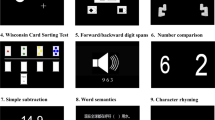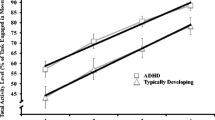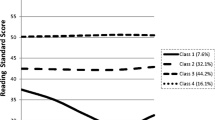Abstract
Previous studies have shown that Attention-Deficit/Hyperactivity disorder (ADHD) is marked by impairments in academic functioning in reading, writing, and mathematics. Yet, virtually no studies have examined academic functioning in terms of both basic skills (e.g., word recognition, handwriting/spelling, arithmetic calculations) and more complex advanced skills (e.g., reading comprehension, writing composition, and mathematical problem-solving) within the same sample. In the present study, 518 children with ADHD were compared to a control group of 851 children without ADHD (ages 8–18) and assessed on a comprehensive battery of reading, writing, and math assessments. It was hypothesized that ADHD diagnostic status would uniquely predict performance on advanced skill measures even after controlling for performance on basic skills in that academic domain. ADHD status was associated with worse performance across all academic tests. Results also indicated that ADHD independently predicted performance for measures of writing composition and one measure of reading comprehension, even after controlling for performance on basic skills in those domains. However, ADHD did not independently predict mathematical problem-solving performance. These findings add to the literature on ADHD and academic functioning and indicate that inattention may weaken skills necessary for effective reading comprehension and writing composition.
Similar content being viewed by others
Data Availability
The data were collected as part of the Colorado learning disabilities research center over two decades, and only a subset of participants provided consent for their deidentified data to be made available to outside researchers. Investigators who are interested in using the subset of data that is available should contact Erik Willcutt, current Director of the CLDRC (willcutt@colorado.edu).
References
American Psychiatric Association. (2022). Diagnostic and statistical manual of mental disorders (5th ed., text rev.). https://doi.org/10.1176/appi.books.9780890425787
Barkley, R. A., & Murphy, K. (1998). Attention-deficit hyperactivity disorder: A clinical workbook (vol. 2nd). Guilford Press.
Barry, T. D., Lyman, R. D., & Klinger, L. G. (2002). Academic Underachievement and Attention-Deficit/Hyperactivity Disorder. Journal of School Psychology, 40(3), 259–283. https://doi.org/10.1016/s0022-4405(02)00100-0
Benedetto-Nasho, E., & Tannock, R. (1999). Math computation, error patterns and stimulant effects in children with Attention Deficit Hyperactivity Disorder. Journal of Attention Disorders, 3(3), 121–134.
Berninger, V. W., Vaughan, K., Abbott, R. D., Begay, K., Coleman, K. B., Curtin, G., Hawkins, J. M., & Graham, S. (2002). Teaching spelling and composition alone and together: Implications for the simple view of writing. Journal of Educational Psychology, 94(2), 291–304. https://doi.org/10.1037/0022-0663.94.2.291
Brock, S. E., & Knapp, P. K. (1996). Reading comprehension abilities of children with Attention-Deficit/Hyperactivity Disorder. Journal of Attention Disorders, 1(3), 173–185.
Cain, K. (2010). Reading Development and Difficulties. Wiley.
Cohen, J. (1992). A power primer. Psychological Bulletin, 112(July), 155–159.
Cutting, L., & Scarborough, H. (2006). Prediction of reading comprehension: Relative contributions of word recognition, language proficiency, and other cognitive skills can depend on how comprehension is measured. Scientific Studies of Reading, 10(2015), 257–275. https://doi.org/10.1207/s1532799xssr1003
Denton, C. A., Tamm, L., Schatschneider, C., & Epstein, J. N. (2020). The effects of ADHD treatment and reading intervention on the fluency and comprehension of children with ADHD and word reading difficulties: A randomized clinical trial. Scientific Studies of Reading, 24(1), 72–89. https://doi.org/10.1080/10888438.2019.1640704
Dubow, E. F., Boxer, P., & Huesmann, L. R. (2009). Long-term effects of parents’ education on children’s educational and occupational success. Merrill-Palmer Quarterly, 55(3), 224–249. https://doi.org/10.1353/mpq.0.0030.Long-term
Dunn, L. M., & Markwardt, F. C. (1970). Examiner’s Manual: Peabody Individual Achievement Test. American Guidance Service.
DuPaul, G. J., Weyandt, L. L., & Janusis, G. M. (2011). ADHD in the classroom: Effective intervention strategies. Theory Into Practice, 50(1), 35–42.
DuPaul, G. J., & Langberg, J. M. (2015). Educational impairments in children with ADHD. In Attention-deficit hyperactivity disorder: A handbook for diagnosis and treatment (pp. 169–190). The Guilford Press.
DuPaul, G. J., Gormley, M. J., & Laracy, S. D. (2013). Comorbidity of LD and ADHD: Implications of DSM-5 for assessment and treatment. Journal of Learning Disabilities, 46(1), 43–51. https://doi.org/10.1177/0022219412464351
DuPaul, G. J., Volpe, R. J., Jitendra, A. K., Lutz, J. G., Lorah, K. S., & Gruber, R. (2004). Elementary school students with AD/HD: Predictors of academic achievement. Journal of School Psychology, 42(4), 285–301. https://doi.org/10.1016/j.jsp.2004.05.001
Efron, D., Sciberras, E., Anderson, V., Hazell, P., Ukoumunne, O. C., Jongeling, B., Schilpzand, E. J., Bisset, M., & Nicholson, J. M. (2014). Functional status in children with ADHD at Age 6–8: A controlled community study. Pediatrics, 134(4), e992–e1000. https://doi.org/10.1542/peds.2014-1027
Feder, K. P., & Majnemer, A. (2007). Handwriting development, competency, and intervention. Developmental Medicine and Child Neurology, 49(4), 312–317. https://doi.org/10.1111/j.1469-8749.2007.00312.x
Feng, L., Lindner, A., Ji, X. R., & Malatesha Joshi, R. (2019). The roles of handwriting and keyboarding in writing: A meta-analytic review. Reading and Writing, 32(1), 33–63. https://doi.org/10.1007/s11145-017-9749-x
Flower, L., & Hayes, J. R. (1981). A cognitive process theory of writing. College Composition and Communication, 32(4), 365–387.
Frazier, T. W., Youngstrom, E. A., Glutting, J. J., & Watkins, M. W. (2007). ADHD and achievement: Meta-analysis of the child, adolescent, and adult literatures and a concomitant study with college students. Journal of Learning Disabilities, 40(1), 49–65. https://doi.org/10.1177/00222194070400010401
Garner, A. A., O’Connor, B. C., Narad, M. E., Tamm, L., Simon, J., & Epstein, J. N. (2013). The relationship between adhd symptom dimensions, clinical correlates, and functional impairments. Journal of Developmental and Behavioral Pediatrics, 34(7), 469–477. https://doi.org/10.1097/DBP.0b013e3182a39890
Geary, David C.. (2000). From infancy to adulthood: the development of numerical abilities. European Child & Adolescent Psychiatry, 9(S2), S11–S16.
Ghelani, K., Sidhu, R., Jain, U., & Tannock, R. (2004). Reading comprehension and reading related abilities in adolescents with reading disabilities and attention-deficit/hyperactivity disorder. Dyslexia, 10(4), 364–384. https://doi.org/10.1002/dys.285
Graham, S., Harris, K. R., & Olinghouse, N. (2007). Addressing Executive Function Problems in Writing. In Executive function in education: From theory to practice (pp. 216–236).
Graham, S., Beringer, V., Weintraub, N., & Schafer, W. (1998). The development of handwriting fluency and legibility in grades 1 through 9. Journal of Educational Research, 92, 42–52.
Graham, S., Fishman, E. J., Reid, R., & Hebert, M. (2016). Writing characteristics of students with attention deficit hyperactive disorder: A meta-analysis. Learning Disabilities Research and Practice, 31(2), 75–89. https://doi.org/10.1111/ldrp.12099
Graham, S., Liu, X., Bartlett, B., Ng, C., Harris, K. R., Aitken, A., Barkel, A., Kavanaugh, C., & Talukdar, J. (2018). Reading for writing: A meta-analysis of the impact of reading interventions on writing. Review of Educational Research, 88(2), 243–284. https://doi.org/10.3102/0034654317746927
Hammill, D. D., & Larsen, S. C. (2009). Test of Written Language - Fourth Edition. Pro-Ed.
Jacobson, L. T., & Reid, R. (2010). Improving the persuasive essay writing of high school students with ADHD. Exceptional Children, 76(2), 157–174.
Jacobson, L. A., Ryan, M., Martin, R. B., Ewen, J., Mostofsky, S. H., Denckla, M. B., & Mark Mahone, E. (2011). Working memory influences processing speed and reading fluency in ADHD. Child Neuropsychology, 17(3), 209–224. https://doi.org/10.1080/09297049.2010.532204
Jastak, S., & Wilkinson, G. S. (1984). Wide Range Achievement Test, Revised: Administration Manual. Author.
Keenan, J. M., Betjemann, R. S., & Olson, R. K. (2008). Reading comprehension tests vary in the skills they assess: Differential dependence on decoding and oral comprehension. Scientific Studies of Reading, 12(3), 281–300. https://doi.org/10.1080/10888430802132279
Kuriyan, A. B., Pelham, W. E., Molina, B. S. G., Waschbusch, D. A., Gnagy, E. M., Sibley, M. H., Babinski, D. E., Walther, C., Cheong, J., Yu, J., & Kent, K. M. (2013). Young adult educational and vocational outcomes of children diagnosed with ADHD. Journal of Abnormal Child Psychology, 41(1), 27–41. https://doi.org/10.1007/s10802-012-9658-z
Lahey, B. B., Applegate, B., McBurnett, K., Biederman, J., Greenhill, L., Hynd, G. W., & Barkley, R. A. (1994). DMS-IV field trials for attention deficit hyperactivity disorder in children and adolescents. The American Journal of Psychiatry, 151, 1673–1685.
Leslie, L., & Caldwell, J. (2001). Qualitative Reading Inventory-3. Addison Wesley Longman.
Lewandowski, L. J., Lovett, B. J., & Gordon, M. (2007). Extended time and the mathematics performance without ADHD. Journal of Pscyhoeducational Assessment, 25(1), 17–28.
Lienemann, T. O., & Reid, R. (2008). Using self-regulated strategy development to improve expository writing with students with attention deficit hyperactivity disorder. Exceptional Children, 74(4), 471–486.
Maniadaki, K., & Kakouros, E. (2018). The Complete Guide to ADHD Nature,Diagnosis, and Treatment. In Taylor & Francis.
Markwardt, F. C. (1989). Peabody Individual Achievement Test - Revised. American Guidance Service.
Mcgrath, L. M., Pennington, B. F., Shanahan, M. A., Barnard, H. D., Willcutt, E. G., & Olson, R. K. (2011). A multiple deficit model of reading disability and attention-deficit/hyeractivity disorder. Journal of Child Psychology and Psychiatry, 52(5), 547–557. https://doi.org/10.1111/j.1469-7610.2010.02346.x.A
McGrew, K. S., & Woodcock, R. W. (2001). Technical Manual: Woodcock-Johnson III. Riverside Publishing.
Miller, A. C., Keenan, J. M., Betjemann, R. S., Willcutt, E. G., Pennington, B. F., & Olson, R. K. (2013). Reading comprehension in children with ADHD: Cognitive underpinnings of the centrality deficit. Journal of Abnormal Child Psychology, 41(3), 473–483. https://doi.org/10.1007/s10802-012-9686-8
Monroe, M., & Sherman, E. E. (1996). Group Diagnostic Reading Aptitude and Achievement Test: Intermediate Form. CH Nevins.
Pearson. (2009). Wechsler Individual Achievement Test, Third Edition. Author.
Peterson, R. L., Boada, R., McGrath, L. M., Willcutt, E. G., Olson, R. K., & Pennington, B. F. (2017). Cognitive prediction of reading, math, and attention: Shared and unique influences. Journal of Learning Disabilities, 50(4), 408–421. https://doi.org/10.1177/0022219415618500
Polderman, T. J. C., Boomsma, D. I., Bartels, M., Verhulst, F. C., & Huizink, A. C. (2010). A systematic review of prospective studies on attention problems and academic achievement: Review. Acta Psychiatrica Scandinavica, 122(4), 271–284. https://doi.org/10.1111/j.1600-0447.2010.01568.x
Rucklidge, J. J., & Tannock, R. (2001). Psychiatric, psychosocial, and cognitive functioning of female adolescents with ADHD. Journal of the American Academy of Child and Adolescent Psychiatry, 40(5), 530–540. https://doi.org/10.1097/00004583-200105000-00012
Santangelo, T., & Graham, S. (2016). A Comprehensive Meta-analysis of Handwriting Instruction. In Educational Psychology Review (vol. 28, issue 2). Educational Psychology Review. https://doi.org/10.1007/s10648-015-9335-1
Smith, Z. R., Langberg, J. M., Cusick, C. N., Green, C. D., & Becker, S. P. (2020). Academic motivation deficits in adolescents with ADHD and associations with academic functioning. Journal of Abnormal Child Psychology, 48(2), 237–249. https://doi.org/10.1007/s10802-019-00601-x
Spiel, C., Evans, S. W., & Harrison, J. R. (2019). Does reading standardized tests aloud meet the scientific definition of an accommodation? Journal of Applied School Psychology, 35(4), 380–399. https://doi.org/10.1080/15377903.2019.1601145
Spiel, C. F., Mixon, C. S., Holdaway, A. S., Evans, S. W., Harrison, J. R., Zoromski, A. K., & Yost, J. S. (2016). Is reading tests aloud an accommodation for youth with or at risk for ADHD? Remedial and Special Education, 37(2), 101–112. https://doi.org/10.1177/0741932515619929
Torgesen, J., Wagner, R., & Rashotte, C. . (1999). A Test of Word Reading Efficiency (TOWRE). Pro-Ed.
Tosto, M. G., Momi, S. K., Asherson, P., & Malki, K. (2015). A systematic review of attention deficit hyperactivity disorder (ADHD) and mathematical ability: Current findings and future implications. BMC Medicine, 13(1). https://doi.org/10.1186/s12916-015-0414-4
Vellutino, F. R., Fletcher, J. M., Snowling, M. J., & Scanlon, D. M. (2004). Specific reading disability (dyslexia): What have we learned in the past four decades? Journal of Child Psychology and Psychiatry and Allied Disciplines, 45(1), 2–40. https://doi.org/10.1046/j.0021-9630.2003.00305.x
Volpe, R. J., DuPaul, G. J., DiPerna, J. C., Jitendra, A. K., Lutz, J. G., Tresco, K., & Junod, R. V. (2006). Attention deficit hyperactivity disorder and scholastic achievement: A model of mediation via academic enablers. School Psychology Review, 35(1), 47–61. https://doi.org/10.1080/02796015.2006.12088001
Wechsler, D. (1974). Manual for the Wechsler Intelligence Scale for Children. The Psychological Corporation.
Wiederhold, J. L., & Bryant, B. R. (1993). Gray Oral Reading Test - Third Edition. Pro-Ed.
Wilkinson, G. S., & Robertson, G. J. (2006). WRAT 4: Wide range achievement test professional manual. Psychological Assessment Resources.
Willcutt, E. G. (2012). The prevalence of DSM-IV attention-deficit/hyperactivity disorder: A meta-analytic review. Neurotherapeutics, 9(3), 490–499. https://doi.org/10.1007/s13311-012-0135-8
Willcutt, E. G., Nigg, J. T., Pennington, B. F., Solanto, M. V., Rohde, L. A., Tannock, R., Carlson, C. L., & Lahey, B. B. (2012). Validity of DSM-IV attention-deficit/hyperactivity disorder symptom dimensions and subtypes. Journal of Abnormal Child Psychology, 121(4), 991–1010. https://doi.org/10.1037/a0027347.Validity
Willcutt, E. G., Pennington, B. F., Duncan, L., Smith, S. D., Keenan, J. M., Wadsworth, S., Defries, J. C., & Olson, R. K. (2010). Understanding the complex etiologies of developmental disorders: Behavioral and molecular genetic approaches. Journal of Developmental and Behavioral Pediatrics, 31(7), 533–544. https://doi.org/10.1097/DBP.0b013e3181ef42a1
Willcutt, E. G., Pennington, B. F., Olson, R. K., Chhabildas, N., & Hulslander, J. (2005). Neuropsychological analyses of comorbidity between reading disability and attention deficit hyperactivity disorder: In search of the common deficit. Developmental Neuropsychology, 27(1), 35–78. https://doi.org/10.1207/s15326942dn2701_3
Willcutt, E. G., Petrill, S. A., Wu, S., Boada, R., DeFries, J. C., Olson, R. K., & Pennington, B. F. (2013). Implications of comorbidity between reading and math disability: Neuropsychological and functional impairment. Journal of Learning Disabilities, 46(6), 500–516.
Funding
The study was supported by a grant from the National Institute of Child Health and Human Developmental (P50 HD 27802). The authors have no relevant financial or non-financial interests to disclose.
Author information
Authors and Affiliations
Corresponding author
Ethics declarations
Ethical Approval
Ethical approval for this study was provided by the Institutional Review Boards at the University of Colorado and University of Denver.
Informed Consent
Informed consent and assent were obtained from all participants prior to beginning data collection.
Conflict of Interest
Authors declare no conflict of interest.
Additional information
Publisher's Note
Springer Nature remains neutral with regard to jurisdictional claims in published maps and institutional affiliations.
Supplementary Information
Below is the link to the electronic supplementary material.
Rights and permissions
Springer Nature or its licensor (e.g. a society or other partner) holds exclusive rights to this article under a publishing agreement with the author(s) or other rightsholder(s); author self-archiving of the accepted manuscript version of this article is solely governed by the terms of such publishing agreement and applicable law.
About this article
Cite this article
Trane, F.E., Willcutt, E.G. Attention-Deficit/Hyperactivity Disorder and Academic Functioning: Reading, Writing, and Math Abilities in a Community Sample of Youth with and without ADHD. Res Child Adolesc Psychopathol 51, 583–596 (2023). https://doi.org/10.1007/s10802-022-01004-1
Accepted:
Published:
Issue Date:
DOI: https://doi.org/10.1007/s10802-022-01004-1




